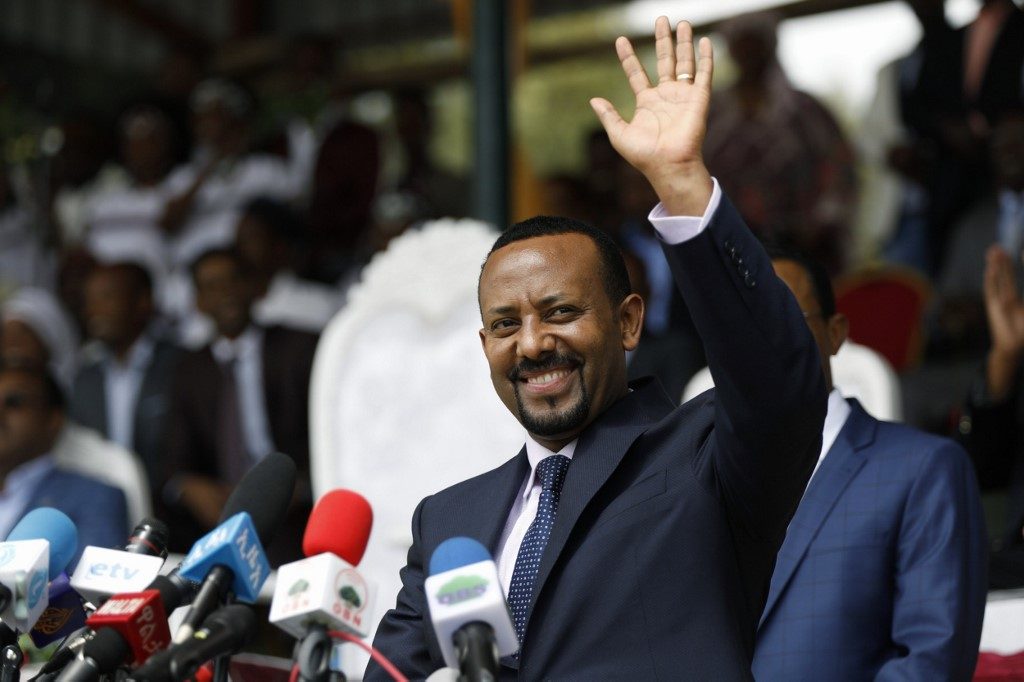SUMMARY
This is AI generated summarization, which may have errors. For context, always refer to the full article.

PARIS, France – Ethiopian Prime Minister Abiy Ahmed was urged to press on with reforms and efforts to heal bitter tensions with neighbor Eritrea after he won the Nobel Peace Prize on Friday, October 11, as observers expressed hope it would spur greater progress.
Abiy, hailed by the Nobel Committee “for his efforts to achieve peace and international cooperation,” sparked a historic rapprochement with longtime foe Eritrea soon after coming to power last year.
It led to the formal end of a 20-year-old stalemate between the countries in the wake of the 1998-2000 border conflict – although the borders that were initially flung open snapped closed again after a few months and severe challenges remain.
The move was part of a dizzying array of reforms within Ethiopia, including releasing jailed dissidents and welcoming home exiled armed groups.
Abiy said he was “humbled and thrilled” to receive the Nobel, adding that he hoped it would inspire other African leaders.
He said he could “imagine how the rest of Africa’s leaders would think it possible to work on peacebuilding processes,” in a call to the Nobel committee.
‘Blood, sweat and tears’
Eritrea’s ambassador to Japan, Estifanos Afwerki, on Twitter hailed the decision, saying the people of Eritrea and Ethiopia “with blood, sweat (and) tears have won again over evil.”
Putting ‘people first’
UN Secretary General Antonio Guterres credited Abiy as one of the main reasons why “winds of hope are blowing ever stronger across Africa.”
He said peace efforts between Ethiopia and Eritrea had inspired hopes of regional “security and stability” and that Abiy’s leadership had “set a wonderful example for others in and beyond Africa looking to overcome resistance from the past and put people first.”
Work ‘far from done’
Rights group Amnesty International credited Abiy with an array of positive changes since coming to power in April 2018, but said more needed to be done to cement a “lasting human rights legacy.”
“This award recognizes the critical work Prime Minister Abiy Ahmed’s government has done to initiate human rights reforms in Ethiopia after decades of widespread repression,” it said.
Amnesty listed reform of the security forces, replacing “the severely restricting charities and society law,” as well as efforts to “broker an agreement between Sudan’s military leaders and the civilian opposition, bringing an end to months of protests.”
But Amnesty said Abiy’s work “is far from done” and warned that tensions within Ethiopia, a mosaic of ethnic groups, “threaten instability and further human rights abuses.”
‘Given the world hope’
African Union chief Moussa Faki on Twitter congratulated Abiy on the win “for his historic peacebuilding efforts that have given the world hope at a time it needs servant leadership more than ever.”
‘Champion for peace’
Kenyan President Uhuru Kenyatta also joined the chorus of those congratulating Abiy.
“Prime Minister Ahmed stands out as a relentless champion for peace, stability and prosperity of his country, our region and the entire African continent,” Kenyatta said in a statement.
‘Model’ nation
The UN High Commissioner for Refugees (UNHCR) hailed the award as a “huge testament” to Abiy’s efforts to bring peace in his region and beyond.
“Ethiopia has a long history of welcoming and hosting refugees from across the region,” the agency said in a statement, adding the country was a “model for other refugee hosting nations around the world.”
Positive change?
The Nobel Committee underlined the crucial role played by Eritrean President Isaias Afwerki in the peace deal.
“Peace does not arise from the actions of one party alone. When Prime Minister Abiy reached out his hand, President Afwerki grasped it, and helped to formalize the peace process between the two countries,” it said in a statement, adding that it hoped it would lead to “positive change for the entire populations of Ethiopia and Eritrea.” – Rappler.com
Add a comment
How does this make you feel?
There are no comments yet. Add your comment to start the conversation.